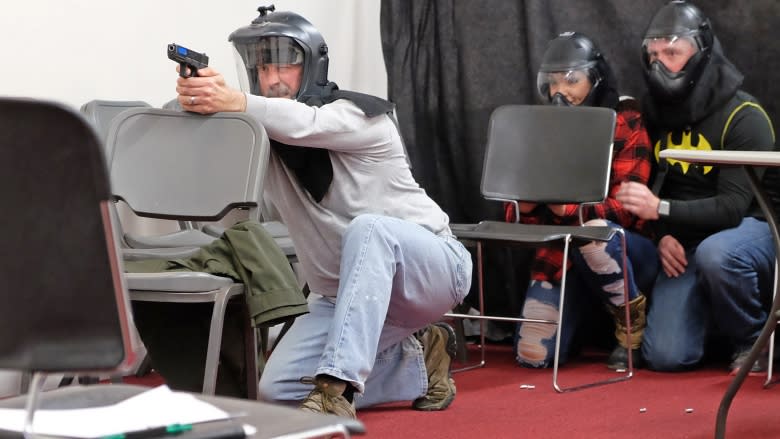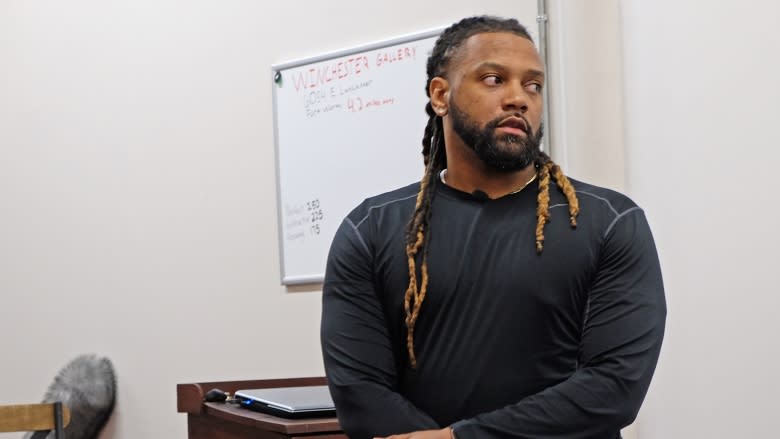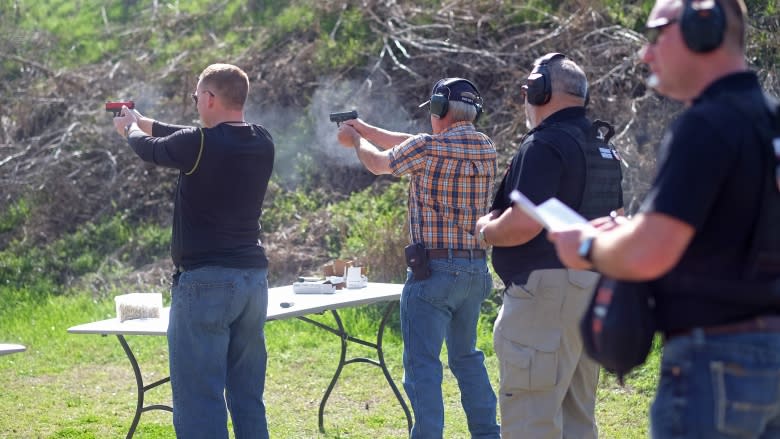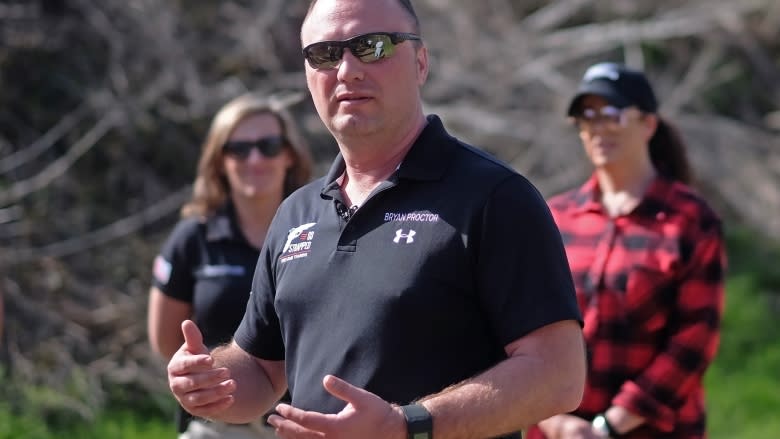'It's my job to protect them': U.S. teachers train to carry guns in class
Thousands are expected to gather in Washington, D.C., on Saturday to push for stricter U.S. gun laws. The March For Our Lives rally is a response to the deadly school shooting in Parkland, Fla., where 17 people died.
Another response to the shooting has been the call to arm teachers.
"Ceasefire! Ceasefire!," retired police officer Bryan Proctor yells to the people in his classroom.
A gunman lowers the automatic rifle he's been firing at Jace Daily — a librarian who works at a high school.
Daily has been hit.
Her hands are shaking and there's a little blood on one of them where a training round — a soft-tipped bullet that still packs a stinging punch — hit her finger.
"My heart is pounding. My voice is shaking — I can feel it," she says. "I think I did okay. It's my first live-shooter simulation and hopefully next time it will be better."
Proctor owns and is the lead instructor at Go Strapped, a firearms training business. He gives Daily specific feedback on how she did, reminding her to keep her distance from the gunman.
WATCH: CBC's The National went to Arlington, Texas, to follow a group of teachers training to carry guns in their classrooms
Then he repeats a blunt message to all the teachers in the room.
"When that active killer is in the classroom, a teacher can either have a pencil or they can have a gun," Proctor says.
'If you call 911 the killing has already started'
Proctor was one of the first people in the United States qualified to train teachers to defend their schools with guns. And Texas is one of the few states that already has a process for teachers to legally arm themselves.
The teachers must have a gun licence, then pass Proctor's two-day course, and finally get permission from their school board before they can carry firearms into their school.
"The point is there are killers in our environment. They will find the weakest people they can kill, the most defenceless, and they will go after them," Proctor says. "If you call 911, the killing has already started. You have to have someone there in order to mitigate the damage."
Daily, who has been licensed to carry in Texas for a couple of years now, volunteered to take the course. She says she wants to do her part to protect the children in her school.
"I believe we have a right to defend ourselves," she says. "I believe if someone is attacking us, we don't just huddle. We actually have skills and are empowered in this country to defend ourselves."
Daily says watching TV coverage of the shooting in Parkland made her think of her own kids.
"As a parent I would at least want to know that my kid's teacher had a gun," she says.
Daily and the other teachers, who already have licences to carry in the state of Texas, go through a few more mock scenarios. Each time, a killer tries to enter the classroom.
They are taught that their first priority is to avoid the gunman altogether, and then to barricade the door to stop the shooter from getting inside their classroom.
Firing their guns is a last resort, Proctor says.
"The goal is not to find and go after a shooter," he says. "The goal is to protect the kids in their care in the classroom they have control over. They are not trained to go after the killer."
'My job is to protect them'
Another trainee in Proctor's program is Jermaine Chambers, a high school teacher who works with at-risk students.
"I coach football. Those are my sons — those are my boys out there. I treat them like my kids," he says. "So if something comes in — it's my job to protect them all."
After Chambers' scenario plays out, in which he and the gunman exchange fire, he's visibly shaken. He can barely speak.
"Everything went cloudy," Chambers admits.
Proctor uses the situation to again drive his point home that no matter how stressed the teachers are, they're better off with a gun than a pencil.
"What's a pencil going to do?," Chambers asks as he tries to catch his breath.
"That's what Parkland found out too," Proctor says, referring to the recent school shooting at Marjory Stoneman Douglas High School in Florida, where 17 people died.
"There's no great solution, there's just a better response," Proctor says.
Reactions under stress
The next part of getting teachers ready happens at a gun range on the outskirts of Arlington.
The teachers have to prove that they can shoot accurately under extreme pressure. Their target is a high-resolution photo of a man holding a handgun to the head of a school-aged child.
"What this does it incorporates a whole new stress to the shooter," Proctor says. "They are gonna be shooting 200 rounds. Out of the 200 rounds, I want to see a good percentage of them in the bad guy. Not missed off the target and not in our good kid."
The teachers line up in row about 20 metres from their targets — their guns and ammunition on a table in front of them.
"If you cannot get a good shot, don't pull it off," Proctor tells the teachers. "I don't care if you are left with ammo in the gun. What I care about is if you start missing your main target."
Before she begins to shoot, Jace Daily tells me she understands full well that taking her gun into her school is controversial.
"A school is traditionally a safe place. It's where innocence is — it's our children. And so I think you have a great polarity there between a gun, which is such a visual image of violence and killing and hatred, and then innocent children," she says.
"For me, I feel like it is my job to protect that innocence. To protect those kids that are in my care."
Proctor stands like a coach with a clipboard in his hands. He barks a few instructions and blows his whistle.
Daily and the other teachers take aim and shoot at the target.
The drills continue for 45 minutes, the teachers moving farther and farther away from the target.
Finally Proctor commands them to put down their guns and make them safe.
He announces they've all passed.
"According to the department of public safety, you've passed the proficiency," he says. "But how do you all feel?"
Norman Rangel, a principal at a nearby private school, looks at his target. He's shot the child hostage several times.
"I hit the kid a few times," Rangel says. "I know it is just paper, but it still impacted me. This is very serious. There's no way to overstate that."
Proctor nods. "If you are not satisfied," he says. "I'm a happy person. Because what would I be satisfied with? 100 per cent, that's what I would be satisfied with."
'It's a big responsibility.'
An obviously shaken Jace Daily stares at her own target. Six of her shots hit the child in the head.
"It's not very good," she admits. "When I first came up [to the target], of course I looked at my misses. I looked at that precious little baby and all the holes in his head. I obviously did some damage to the bad guy too."
She pauses and takes a deep breath.
"I need some practice," she concludes.
Asked if seeing the little kid makes the idea of a school shooting more real, Daily says, "For sure. I have 7-year-old boys and they are about that size," she says — her voice unsteady.
"It's a big responsibility."
More from CBC
Watch Nick Purdon and Leonardo Palleja's video feature from CBC's The National about the gun-training school for teachers in Arlington, Texas:









